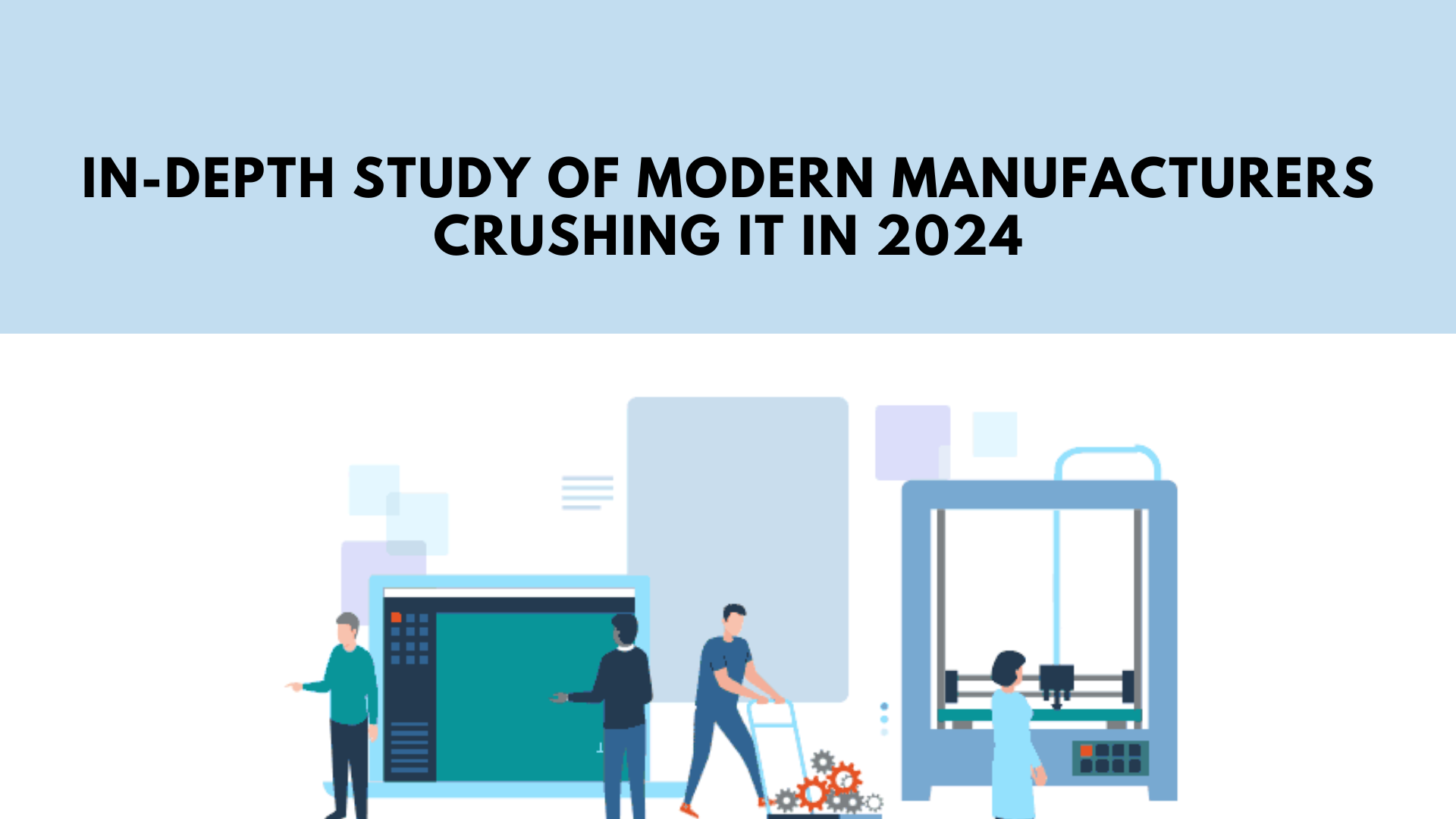As we navigate through 2024, the manufacturing landscape is rapidly evolving, driven by advancements in technology, shifts in consumer demands, and a growing emphasis on sustainability. Modern manufacturers who are thriving this year are those who have adeptly embraced these changes, setting new standards for innovation and efficiency. In this in-depth study, we explore key factors that are propelling these trailblazers to the forefront of the industry.
The Rise of Smart Manufacturing
Smart manufacturing integrates cutting-edge technologies to create more efficient, flexible, and agile production processes. Here’s how top manufacturers are leveraging these advancements:
1. Artificial Intelligence (AI) and Machine Learning (ML)
AI and ML are revolutionizing the manufacturing process. Companies like Siemens and Bosch use these technologies to predict maintenance needs, optimize production schedules, and enhance quality control. For instance, Siemens employs AI-driven systems to monitor machinery and predict failures before they occur, reducing downtime and maintenance costs.
2. Internet of Things (IoT)
IoT connects devices and systems across the production line, enabling real-time data collection and analysis. General Electric (GE) has integrated IoT into their operations through their Predix platform, allowing for precise monitoring and control over production processes. This connectivity improves efficiency, reduces waste, and enhances product quality.
3. Robotics and Automation
Automation and robotics are crucial in increasing productivity and consistency. Fanuc, a leader in industrial robotics, deploys advanced robots for tasks ranging from simple assembly to complex welding. These robots not only perform repetitive tasks with high precision but also adapt to different production needs, making the manufacturing process more flexible and scalable.
Sustainability: The New Norm
Environmental consciousness is no longer optional but a crucial component of modern manufacturing. Leading companies are setting benchmarks in sustainable practices:
4. Circular Economy Models
Manufacturers like Patagonia and Interface are pioneers in the circular economy, designing products with their entire lifecycle in mind. Patagonia, for example, focuses on producing durable goods that are repairable and recyclable, reducing overall waste and resource consumption.
5. Green Manufacturing Technologies
Adopting green technologies helps manufacturers minimize their environmental impact. Tesla utilizes renewable energy sources and innovative production methods to reduce its carbon footprint. Their Gigafactories are designed to be energy-efficient and incorporate sustainable practices throughout the manufacturing process.
6. Waste Reduction and Recycling
Effective waste management is a key sustainability goal. Unilever has implemented zero-waste-to-landfill policies across their global factories, reusing or recycling waste materials. This approach not only minimizes environmental impact but also creates economic value from waste.
Advanced Supply Chain Management
Supply chain efficiency and resilience have become critical in the face of global disruptions. Here’s how leading manufacturers are excelling in supply chain management:
7. Digital Twins
Digital twins are virtual replicas of physical assets that allow manufacturers to simulate and optimize processes. Rolls-Royce uses digital twin technology to monitor and predict the performance of their engines, enhancing maintenance and operational efficiency.
8. Blockchain for Transparency
Blockchain technology provides transparency and traceability throughout the supply chain. Walmart has implemented blockchain to track the provenance of their products, ensuring food safety and supply chain integrity. This technology helps in quickly identifying and addressing issues, such as contamination or counterfeit goods.
9. Resilient Sourcing Strategies
Diversifying suppliers and adopting flexible sourcing strategies help companies manage risks. Apple has diversified its supplier base and established robust contingency plans to mitigate the impact of disruptions, ensuring continuous production and supply chain stability.
Human-Centric Manufacturing
Despite the rise of automation, the human element remains crucial. Modern manufacturers are fostering inclusive and engaging work environments:
10. Workforce Upskilling
Continuous learning and upskilling are vital in a technology-driven industry. Companies like Siemens and IBM invest heavily in training programs to equip their employees with the latest skills in AI, robotics, and digital tools, ensuring their workforce remains competitive and adaptable.
11. Diversity and Inclusion
A diverse workforce brings varied perspectives and innovation. Procter & Gamble (P&G) actively promotes diversity and inclusion within their teams, recognizing that a broad range of experiences and backgrounds contributes to creativity and problem-solving.
12. Flexible Work Environments
Flexibility in the workplace enhances employee satisfaction and productivity. 3M has implemented flexible working arrangements and policies that support work-life balance, attracting top talent and maintaining a motivated workforce.
Case Studies: Manufacturers Leading the Way
Tesla: Redefining Automotive Manufacturing
Tesla continues to disrupt the automotive industry with its innovative manufacturing processes and commitment to sustainability. The company’s Gigafactories utilize advanced automation, AI, and renewable energy to produce electric vehicles at scale. Tesla’s focus on vertical integration and in-house production of key components like batteries sets them apart, enabling rapid innovation and efficiency.
Protolabs: Pioneers in Digital Manufacturing
Protolabs specializes in rapid prototyping and on-demand production, leveraging digital technologies to offer fast and cost-effective manufacturing solutions. Their use of 3D printing, CNC machining, and injection molding allows for quick turnaround times and high customization, catering to the evolving needs of modern businesses.
Nike: Leading with Sustainability and Innovation
Nike has integrated sustainability into its core operations, from product design to manufacturing. The company’s Flyknit technology reduces material waste by knitting shoes in a single piece, and their Move to Zero initiative aims for zero carbon and zero waste. Nike’s innovative approach not only minimizes environmental impact but also enhances product performance and appeal.
Conclusion
The success of modern manufacturers in 2024 lies in their ability to adapt to technological advancements, embrace sustainability, and prioritize human capital. By studying these leaders, other businesses can gain valuable insights into the strategies and practices that drive success in today’s dynamic manufacturing environment. As we move forward, the principles of innovation, sustainability, and resilience will continue to shape the future of manufacturing.
Whether it’s through leveraging AI and IoT, committing to sustainable practices, or fostering a skilled and inclusive workforce, the manufacturers thriving in 2024 are those who are prepared to meet the challenges and opportunities of a rapidly changing world.









